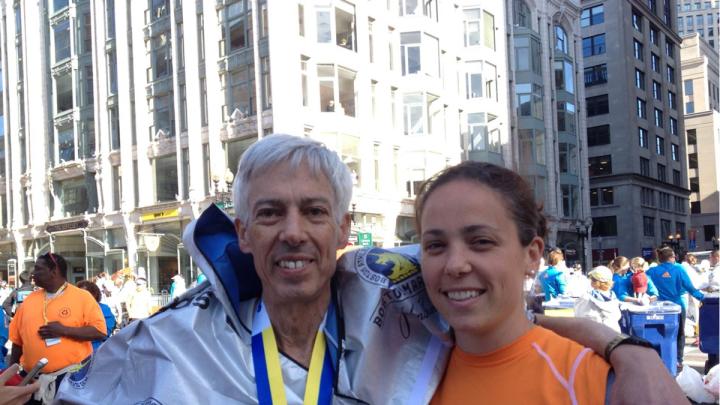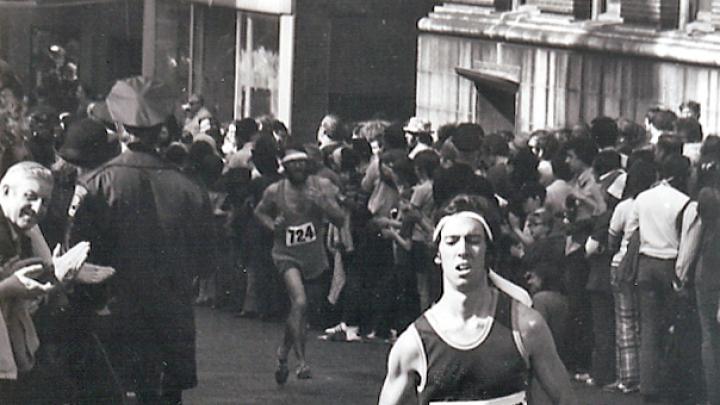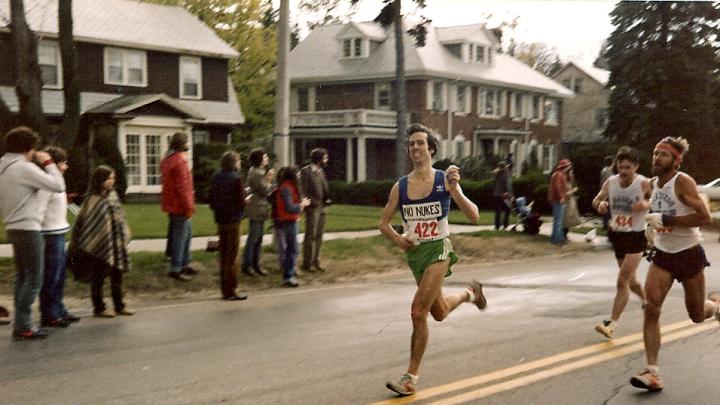The bombs that disrupted the Boston Marathon last April, killing three and injuring many more, horrified the country. They also cut the race short for many dedicated runners. Yet, behind the motto “Boston Strong,” the city of Boston and the marathon community itself determined to soldier on, undeterred and even reinvigorated. Take Ben Beach ’71. At the time of the explosions, Beach had run 21 miles of the 26-mile-plus course, and was close to setting a new record for most consecutive Boston Marathons ever run and finished. (His brother, Randall Beach, in town with his family to witness the accomplishment, published an eyewitness account of the bombings in the New Haven Register.)
Last June, the Boston Athletic Association, which organizes the marathon, determined that anyone who had passed the midway point in Wellesley Hills before authorities halted the race would be deemed to have completed the 2013 marathon. Thus, Beach had officially recorded his forty-sixth consecutive Boston Marathon completion, setting a new record. At this year’s race, on April 21, he pushed that mark one notch higher, finishing his forty-seventh consecutive race in a time of 5:26. The 2014 marathon was the race’s 118th running; as none of the four other major marathons—New York, Berlin, London, and Chicago—existed when Beach started his streak in 1968, his record in effect applies to all marathons on the planet.
Beach first ran Boston as a Harvard freshman, and has not missed the event since. In a Boston Globe column before last year’s race, John Powers ’70 noted that “Beach made his debut in a day when obtaining a starting number meant talking your way past Jock Semple, the race’s skeptical Scottish gatekeeper. ‘What makes ye think ye can rrrun 26 miles?’ Semple asked Beach when he answered the phone. ‘I’m not sure I had much of an answer for him,’ Beach recalls. ‘I hadn’t run more than 5 miles, I had never been on a cross-country team, and I had never run a road race.’”
Powers observed that Beach’s 17 sub-2:40 finishes are equaled only by Olympian and Boston Marathon legend Johnny “The Elder” Kelley (1907-2004), who started 61 such races and finished 58 of them, including wins in 1935 and 1945, though his longest consecutive streak was 23. In another Globe article before this year’s race, Powers updated the Beach saga.
When Beach knocked off his 1968 run in 3:23:50, another “streaker,” as marathon parlance has it, had already started a similar skein. Neil Weygandt of suburban Philadelphia began his Boston streak in 1967, making his string a year senior to Beach’s. The two men learned of each other’s existence several years ago and began exchanging Christmas cards and starting-line greetings. But after Weygandt sat out the 2012 contest for physical reasons, the pair were tied at 45 consecutive races. Last April, Beach, then 63, broke the tie. Even so, he can hardly rest on his laurels. Nantucket physician Timothy Lepore ’66 finished his forty-sixth consecutive Boston run in 7:10, a couple of hours after Beach recorded his forty-seventh.
The 125-pound Beach is a small runner who has shown genuine speed, finishing as high as thirty-fourth in Boston. His personal best is a 2:26 recorded at the New York City Marathon; in the early 1980s, he completed three different Bostons in 2:27. “I was in either a rut or a groove,” he says.
He lives in Bethesda, Maryland, with his wife, Carol; they have three children. The former longtime editor at The Wilderness Society currently works as a writer and editor for the State Department. He likes stability: he’s been to every Harvard-Yale football game since 1966, and he and Carol have hosted an annual tailgate there since 1973.
For the last 11 years a nerve condition called dystonia has hampered Beach’s running ability. “It’s part of the Parkinson’s family, but it isn’t progressive,” he explains. Brain signals cause his left hamstring muscle to contract at inappropriate times, so that it fights against the quadriceps: the result is that Beach has to “swing” his left leg in what is closer to a limp than a normal running stride. “It isn’t pretty,” he says. Nowadays, a typical month’s training will be 50 or 60 miles— “what I used to run in a week.” Even so, he bicycles several miles each way to work and runs stadiums. And Boston isn’t Beach’s only running streak: this spring, he ran the annual 10-mile Cherry Blossom race in Washington, D.C. He’s completed all 42 of them.











